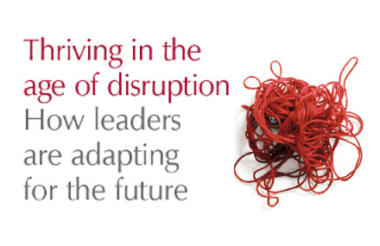Resilience, communication and humility are among the most important traits of successful charity chief executive, according to a survey of fifty sector leaders.
The report, Thriving in the age of disruption: How leaders are adapting for the future, is based on recruitment profiles for charity chief executives, as well as interviews with leaders.
The report was compiled by recruitment firm Gatenby Sanderson. It says that effective chief executives are:
- Unfazed by ambiguity and disruption
- Agile in their thinking
- Self-aware and able to understand their impact on others
- Inspirational through a clear vision and strategy
- Effective communicators
- Searching and quick to get to the heart of the matter
- Authentic and unwavering on mission and purpose
- Resilient
- Humble
- True to themselves
The report said that prospective chief executives are having to show more softer skills, and that many find they have to make changes in the way they work to become successful leaders.
The report also found that resilience was an important and growing issue. As charity leaders found themselves facing difficult conditions, self-belief and the ability to carry on in the face of difficulty were vital traits.
The report also found that as charities became more involved in trading, chief executives were having to make a difficult balancing act between business and voluntary drivers.
What the report says:
“Truly effective leaders embrace disruption. They are not distracted or fazed by it. They can measure their own success and judge the progress and performance of their organisation in the context of continual change. They are constantly balancing many moving parts, can spot opportunities in that context and have the courage and judgement needed to respond to them.”
“In an age of increased scrutiny and public interest, the onus for running an organisation well cannot solely rest with one person. Running today’s organisations must be the collective responsibility of the board and the executive together.
“In recruiting chief executives, boards need to consider the changing demands of their organisation and what this means in terms of emerging skill requirements. They should be prepared to support and invest in their development and ensure the chair/chief executive relationship is resilient enough to withstand change and uncertainty.”
“In an era of constantly declining resources, the key to success lies in authenticity. Staying true to the vision and mission is critical. Today’s chief executives are tasked with thinking innovatively about funding sources in an increasingly competitive environment, they must find ways to ensure future sustainability and growth.
“Great chief executives balance these tasks with a powerful and visible commitment to their organisation’s purpose. They don’t deviate from it, whatever the temptation.
“We have noticed a clear shift in emphasis when it comes to some of the softer skills for leadership. This includes a move away from the more traditional set of senior management requirements, often inward facing and operationally focused, and which assumed that all chief executives needed to be an expert in every discipline within their organisation.”
Related articles












